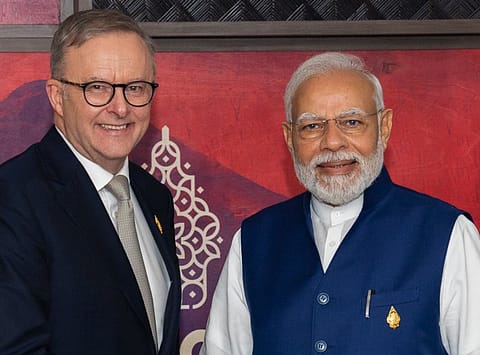India-Australia ECTA goes live with 93% trade duty-free
The ECTA has the potential to double bilateral trade in goods and services to $45 billion in five years, CII says.

The Economic Cooperation and Trade Agreement (ECTA) between India and Australia came into force on December 29. The interim trade deal, signed seven months earlier, will see $23 billion worth of bilateral trade, almost 93% of the India-Aus bilateral trade last year, turning duty free from the first day.
The ECTA has the potential to double bilateral trade in goods and services to $45 billion in five years, industry chamber Confederation of Indian Industry (CII) says.
Announcing the deal early during the year, commerce minister Piyush Goyal said ECTA would give a big boost to several sectors of the economy, especially textiles, gems and jewellery and pharmaceuticals. The government estimates about 10 lakh jobs are estimated to be created in India as the result of the ECTA. It is also expected the agreement would open new opportunities for the service sector in India and would immensely benefit students by offering them an opportunity to work in Australia. Annual Australia will provide visas to 1,800 yoga teachers and chefs from India annually as part of the agreement.
"Australia and India are increasingly working together as strategic and economic partners. India Australia ECTA is a ground-breaking agreement that will leverage the industry to capitalise the enormous untapped potential. The agreement is expected to boost investments, enhance market access, create additional job opportunities, and most importantly strengthen the bilateral ties of two important players in the Indo-Pacific region” by Sanjay Budhia, chairman, National committee on EXIM and managing director of Patton International Ltd.
ECTA mandates Australia to provide zero-duty access to India for 100% of its tariff lines (98.3% tariff lines from day one and the remaining 1.7% in a phased manner in 5 years). India, on the other hand, will provide zero-duty access to Australia for 70.3% of its tariff lines (40.3% tariff lines from day one and the remaining 30% in a phased manner). India has offered zero duty access on coal, alumina calcined, manganese ore, copper concentrates, bauxite, sheep meat, rock lobster, macadamia nuts, cherries, and wool.
Another important announcement made by the Australian Parliament is the double tax avoidance agreement (DTAA) ratification, along with its trade deal with India. The DTAA may come into force on April 1, 2023, and is expected to eventually lead up to $ 1 billion in savings for Indian IT companies operating in Australia. The deal is expected to lead to $10 billion jump in India’s merchandise exports by 2026-27.